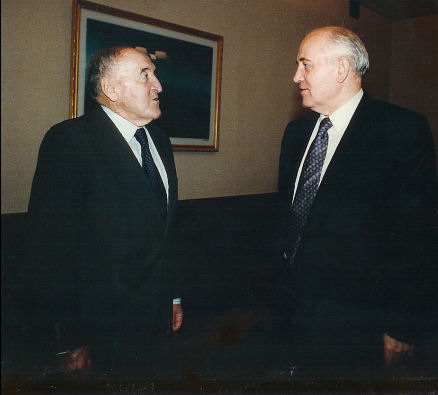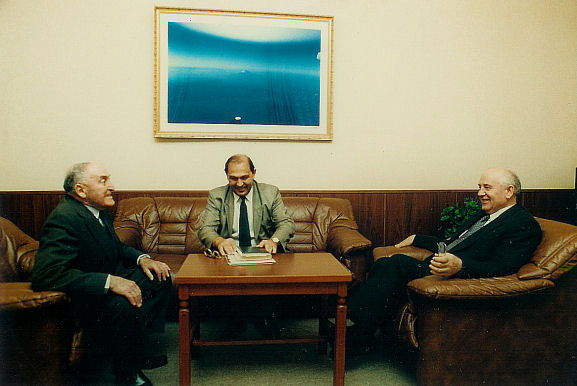| A MEETING WITH GORBACHEV |
|
The idea of trying to meet Mikhail Gorbachev first occurred to me when I had almost completed writing my memoirs. While going through the epilogue I realized that something was missing. Mikhail Sergeyevich Gorbachev, the last president of the Soviet Union, was the one who opened the gates for the mass emigration of Jews in the late '80s. Since 1990 I have visited Moscow several times. In 1990 I met Vladimir Tumarkin, then a senior employee at the ideological department of the Central Committee of the Party. Later on I met him again when he was working for the "Gorbachev Foundation," founded following the enforced retirement of Gorbachev from political activity. During our meeting this past spring, I told Tumarkin about my book, and mentioned the absence of Gorbachev's figure in it, though he was closely linked with the last chapter in the struggle for freedom of emigration for Soviet Jews. Tumarkin mentioned that Gorbachev might wish to talk to me. And so it came about. On July 7th, 1995, I found myself seated opposite the man who had dared to lead the Soviet Union into the great turmoil which changed the face of the world. The meeting took place in Gorbachev's office, in the large building which formerly was a top party school for Communist Party cadres. This building, which most probably looked more impressive in the past, was initially given to the Social and Political Research Foundation bearing Gorbachev's name and supervised by him. But soon, by President Yeltzin's order, the Foundation was left with only one modest wing, while the rest of the building was handed over to a governmental finance institute. Gorbachev's room, though spacious, is modestly furnished (in complete contradiction to the offices of high officials in Russia). Gorbachev radiated health, energy and good humor. He greeted me warmly. At his request, Tumarkin joined us in our conversation. I opened and thanked Gorbachev for granting me of his time. (Tumarkin told me earlier that our meeting was to last 30 minutes, unless the host was interested and wished to prolong it.)  I enquired whether I needed to introduce myself, and when my host was in no hurry to answer, I told him that I am a kibbutznik, one of the founders of kibbutz Kfar Blum. In the '50s, I was sent to Moscow as an agricultural attache at the Israeli Embassy, but my main job was to contact Jews, whose fate, in those years, caused deep concern within the Israeli government. I further mentioned that because of my contacts with Jews, two years later I was "requested" to leave the Soviet Union. After I left Moscow, I was assigned to lead a campaign in the West, to seek public and political pressure upon the Soviet Union to change its attitude to its Jewish minority and allow the Jews--who so wished--to emigrate to Israel. I described my activities throughout many years, and mentioned that I worked under three Prime Ministers as head of the office that dealt with the fate of Jews in Eastern Europe. Naturally I mentioned my book and added that I thought I must include a chapter covering his role in the decision to open the gates to Jewish emigration. I told Gorbachev that I assumed that compared to changes that influenced the fate of hundreds of millions of human beings, the opening of the gates of the Soviet Union to Jewish emigration was but a very small detail to him. But, I added, in Jewish history of the 20th century, the emigration of Jews from the Soviet Union was the third most important event, after the horrible Holocaust experience and the establishment of the State of Israel. Therefore I felt, so I told him, that I should speak to the man who took the final decision to open the gates. I asked him how he made the decision on Jewish emigration, while the legislation on free emigration for everyone was in fact completed only several years later. Gorbachev replied at length, and sounded quite frank. In fact, he claimed, he did not favor mass emigration of Jews. Jews contributed a great deal to the Soviet Union as prominent scientists, good engineers, doctors, musicians, artists, writers, and teachers. Russia certainly needed them as it faced its most crucial changes. But, Gorbachev went on, he knew what pushed the Jews to emigrate. He knew of their will to join the Jewish State, but he was also aware of their bitter fate as a minority in the Soviet Union. He knew of the antisemitic undertone in the press and of the publication of antisemitic books, as well as of the fact that Jews were victims of discrimination and insults. He personally remembered the sad story of his student friend, Lieberman, who was rudely insulted when riding in a streetcar. Therefore, when he worked on the great political, economic and social changes of the Soviet Union, he realized that Jews who so wished should no longer be prevented from emigrating and joining the Jewish State. Gorbachev added that, post factum, he is glad he took that step even before the State was ripe for advanced general legislation on the subject of emigration. Gorbachev frankly admitted that for him to realize that granting human rights was a universal must, he had to "work on himself" to learn from whatever he had already experienced during perestroika. He needed time and serious efforts in order to clear away all the obstacles in the path of free emigration for all.  Gorbachev talked at length about the deep impression his visit to Israel had made upon him. He was fascinated by the fact that after thousands of years, free, devoted and bold Jews managed to build a flourishing state, turning deserts into fields and gardens, developing advanced industry and the capability to protect itself against its enemies. During his visit, he added, he saw the way this country absorbs immigrants from Russia. He met many of them and was confident that they will, in due time, contribute to the cultural, scientific and economic ties with Russia. Gorbachev smiled when he expressed his hope that the immigrants from Russia are not giving in the beginning too many headaches to the State. I mentioned that the Russian aliyah contributes a great deal to Israel and that we believe that by the end of the century the number of Jews immigrating since the '50s from the Soviet Union and the CIS (Commonwealth of Independent States) will reach about a million. At this point Gorbachev led our conversation to subjects he seemingly was interested to bring up. He mentioned that Israel can serve as an example to Russia in its rehabilitatiion process. The Jews, he said, in order to build their country--society, economy and culture--did not merely imitate developed Western countries, but rather created original social and economic patterns, as well as their own unique defense forces. He himself, claimed Gorbachev, was accused, on the one hand, of destroying the old regime, the one that had brought the Soviet Union to social and moral degeneration, and on the other hand, those who insisted to rush the process, losing their common sense, claimed that he, Gorbachev, was hesitant and had surrendered to the conservatives. This heedless gallop, no doubt, brought Russia closer to the state of a Third World country: Manufacturing was almost paralyzed and economy concentrated in selling natural resources, in trading and in a great deal of stealing. Gorbachev stressed that he was still confident that an overnight change in Russia was inconceivable. Russia, with its long history, and the Russian people, whose character and traits have developed for hundreds of years, ending in 70 years of the Soviet regime, such a country and its people cannot turn overnight from tyranny to enlightened democracy and from a centralist Soviet economy to an advanced market economy. A transitory stage was essential, and original ways and economic and social patterns needed to be found to fit the conditions and the character of the population. This was the way to bring Russia to true democracy and a flourishing economy, he said. I told Gorbachev that only two weeks before, in New York, I had a talk with Max Frenkel, former editor of The New York Times. I met Max during the '60s, when he served as head of The New York Times bureau in Washington. A highly intelligent, sensible and broad-minded person, he was earlier the Times correspondent in Moscow and ever since, had shown interest in developments in that part of the world. Frenkel asked something like--"Many claim that in fact Gorbachev has remained a communist. What is your opinion?" I replied that I would love to meet Gorbachev, and if and when I succeeded--would pose this question to him. Gorbachev turned serious and responded immediately: -- "What does it mean nowadays being a communist?" he asked, "Does it mean being a member of the Communist Party? Does it mean supporting the Soviet regime as it was before the perestroika? I am no member of the party, and as for the Soviet regime, who has acted more than me to change the failing regime?" As for his personal outlook on the world, Gorbachev said he aspires to a free, democratic society, humane, just and enlightened. Throughout our conversation the man talked with confidence, occasionally with some excitement. I noticed how I gradually joined all those who think that Gorbachev believes his hour is yet to arrive. Our conversation lasted for about 50 minutes. |
[to homepage]